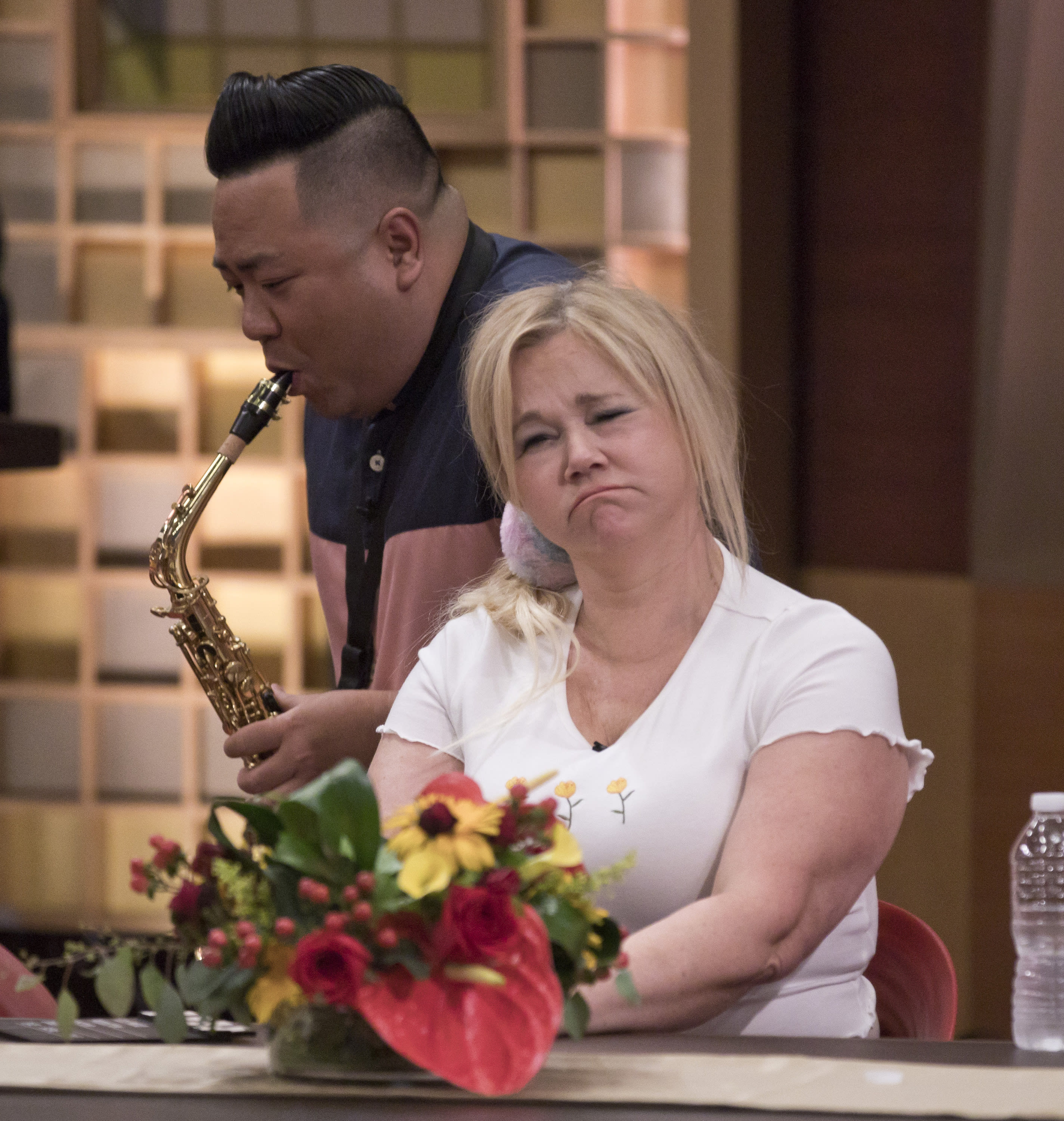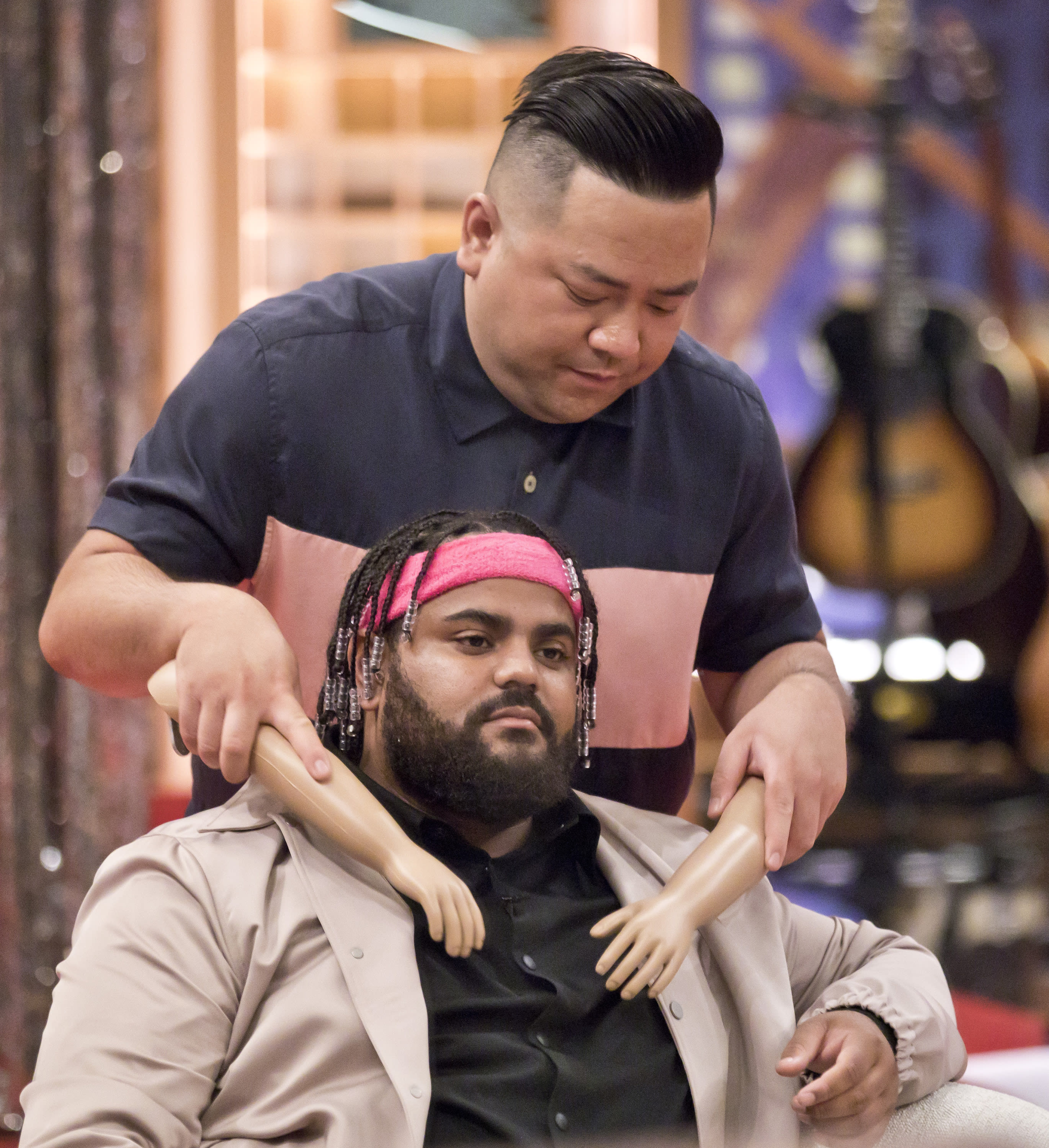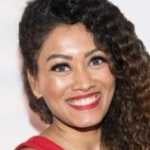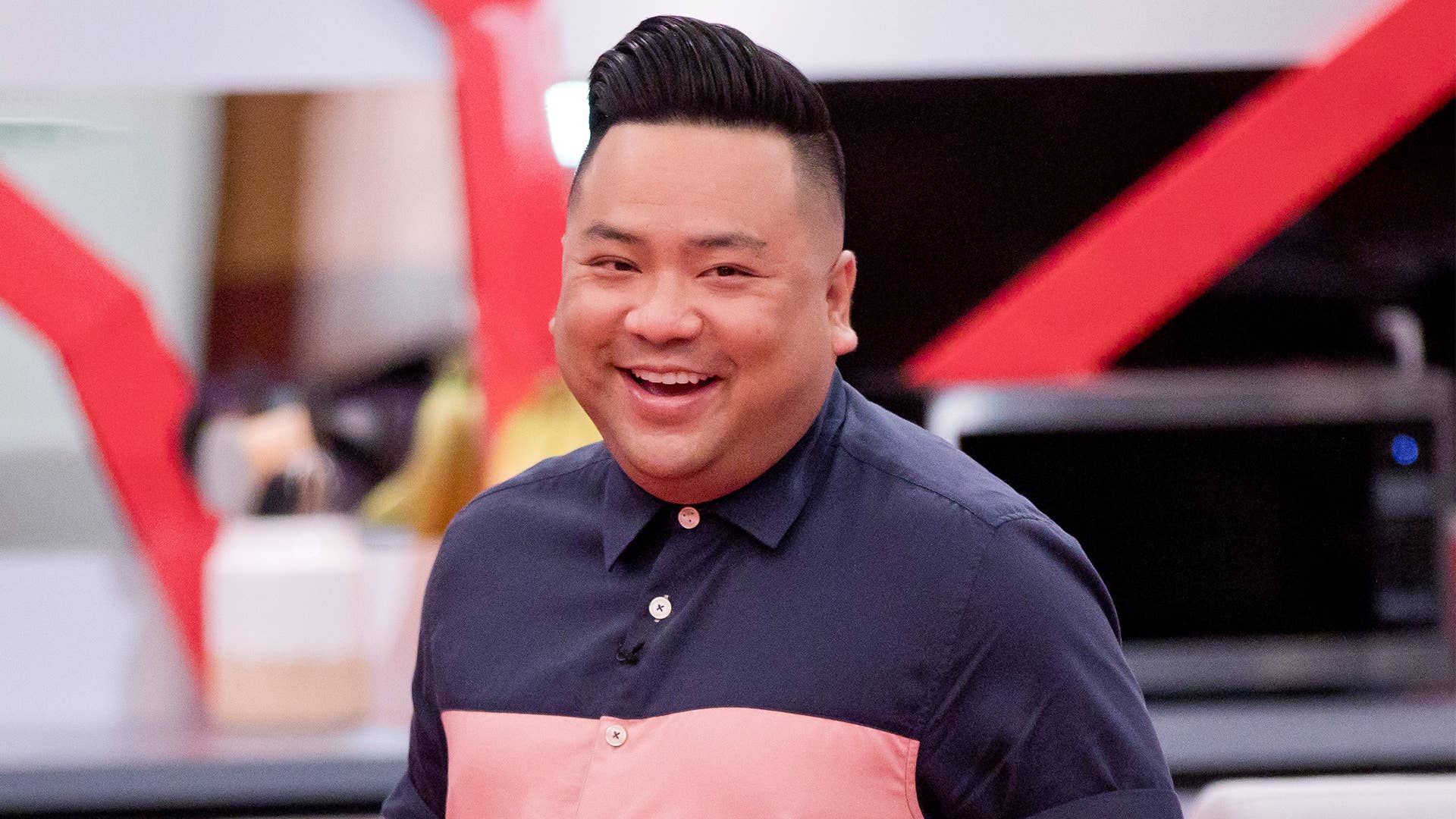
Andrew Phung has been keeping busy since his beloved stint on Kim’s Convenience ended. He has since created and starred in the CBC comedy Run the Burbs, and now lends his stitch-inducing talents to the Amazon Original series LOL: Last One Laughing Canada. Jay Baruchel hosts the Canadian version of this international hit comedy series, wherein 10 Canuck comedians compete to make each other laugh, while not laughing themselves; the comedian who doesn’t break a smile wins $100,000 for the charity of their choice.
The 10 contestants are a mix of legends who have been in the business forever as well as the next generation of comics: Caroline Rhea, Debra DiGiovanni, Dave Foley, Jon Lajoie, Tom Green, Mae Martin, Colin Mochrie, Brandon Ash-Mohammed, Andrew Phung, and K. Trevor Wilson.
Each contestant gets to bring their own bag of tricks, either using props or a performance that worked to their advantage. Phung managed to keep his poker face going, and faced quite the competition from his peers, who were all kept in the dark about the identity of the other participants.
Amazon Studios’ six-episode series takes place over six hours as they compete for laughs, while Baruchel hands out red cards. The first two episodes of the series air on Feb. 18.
We caught up with Phung to chat about his experience on the show, the comedians who surprised him, what he thinks of the Canadian comedy scene, and the change he hopes to see.
What attracted you to this role in the first place? Because it is wild and the craziest, absurdest yet most hilarious form of comedy I’ve ever seen.
Yeah, I remember when they reached out I said no because I was too busy with Run the Burbs. Like, they wanted to shoot in August and we were in pre-production to start shooting at the end of August. I shot this and then went right into Run the Burbs. But then one of my producers said, “No, go watch the Australian version.” I said alright. So I watched the Australian version. I said, “I need to do this.” I love challenges. I love opportunities to prove myself. I felt like it was a challenge to stake my claim that I deserve to be a part of this group. I’m really competitive and so it seemed like a really a great place to just do comedy. I love comedy and I love improvising. That’s my background, so I love the ability to just come into a space and figure it out.
So when you went into the room, and we see you meeting the cast, was that the first time you met them?
Yes, it was the first time I met them. I remember in the two days before, all the dressing rooms were blacked out and they only had numbers. And all they would do is like, if I had to pee, they’d be like, “Number two has to pee. Number two is all clear. Number two is walking to the bathroom. Number two is peeing. Number two is back in the dressing room.” That’s how tight it was. I did not know who was in the room or who was in the cast. I had no idea. So when Colin Mochrie walks in, I’m genuinely in shock and very nervous about what’s to come.
“I think we have a lot of work to do still. I think now we’re seeing more diverse comedians, but that takes time; it takes time to see yourself up on the screen or on the stage.”
I have to say, you have a pretty solid poker face. Do you think you have a good poker face to last long enough? How confident were you going in?
I just didn’t want to be the first one eliminated. That was it. Whenever you watch reality TV, you’re like, “Oh, I just don’t want to be the first one gone.” And so leading up to it, I would do a thing where I would just try to get my kids to make me laugh. I would just sit there and I was just trying to figure out the balance, just killing my soul on the inside, because I love laughing and I love smiling. I love engaging with people. So I was practicing beforehand. But once we started playing the game, you kick in because I realized I’m playing for money for charity—that’s really important for me. I’m the former director of a non-profit. I knew where this money was going to go and I really wanted to win for them. So that was a key.
I remember when I auditioned for Second City, I was still in Calgary and I came out and I was so nervous because I was like, ‘Everyone’s going to be so much better than me.’ I remember my first audition, I was improvising with a group of six. And I was like, ‘Oh, I can hang with y’all.’ Then there’s some more callbacks and I was like, ‘Oh, I got this.’ So there is this element when I was in this room with people. After the first 20 minutes, I was like, ‘OK, I think I could do this.’ It was less confident than the other times. But it was a sense of like, ‘I can be here for a little bit. Let’s see if we could play this game.’ Then as things happen and the game progresses, you’re like “OK, alright. I’m feeling it now.’ So my confidence built up more and more as we went on with the game.
Dave [Foley] said that comedy is about catching someone by surprise. So did you think of a strategy of how to exploit another comedian’s weakness?
Yeah, one thing I realized very early on, some comedians are bringing their own material. But what happens is when all the comedians go, “Hey, hey, hey, look at me.” You’re like, “OK I will look at you. But I’m also prepared.” Like, I know you’re going to do something. Often when people find out I do comedy, they look at me, like, “Cool. You do comedy? Make me laugh!” That is exactly the point. I say, “No, I will not because you don’t want to laugh.” Right? Comedy comes from spontaneity. So when people were setting up their bits, I was like, ‘OK, I know how to work my way through this.’ It was off-the-cuff comments. It was being in silly scenarios. It was someone doing a funny voice. It was someone finding a funny prop and just in the moment doing something. That’s where I realized that I was in trouble, because that’s when we’re at our best.

Who were you most intimidated by before going in and then who really tested you on the show?
It’s tough because all of them are so dangerous. Colin Mochrie, Tom Green, Jon Lajoie were the people I look up to them so much. I grew up with John and Tom Cullen is a legend. I just felt like they had the skills to do it. But then also, I didn’t want to underestimate anyone—like Brandon Ash-Muhammad is someone that is one of my peers. I really look up to him as well. He’s very funny. He’s a personality and so that’s what I was worried about. Deborah just says whatever she thinks of and that’s what scares me. Caroline Rae too, to certain extent, but because I had known Caroline from before, I felt like I had a sense of her personality so I know what to watch for. So everyone was dangerous. Probably Tom was the one I was most afraid of, because I just grew up watching that guy, you know?
“K. Trevor Wilson, the working man of comedy, is very different than Brandon Ash-Muhammad, but also both very Canadian. That makes me really proud that these are two Canadian comedians with different points of view, but they’re connected by this beautiful country.”
Brandon was the one who surprised me the most. Who was the one who surprised you either with their comic timing or with the ability to keep a poker face?
Oh, Brandon Ash-Mohammed. Like, that guy has a poker face like no other. And I think it’s because he just has a personality. He has a way of making you work for him. Like, he has a way of making you prove your worth to him. He’s very high-status in a good way and he has a personality, like he’s so cool. He’s got the swagger behind him. Then Brandon came with a bag of tricks and that’s when you’re seeing Brandon in these characters, in these spaces that I’m like, “Oh, I was not ready for that.” With Tom and Colin, you’ve seen them. You’ve seen so many versions of them. With Brandon, we have just started to see him. And so he really surprised me. It’s cheesy to say, but Colin was surprising because somehow he’s even funnier. Like, I’ve performed with this man. I’ve watched him for 25 years. Somehow in person and on a personal level, he’s funnier, you know? So as the show goes on, and we see more of the people behind the character.
I will say Deborah, and Caroline were a bit more chilled to start the game. And that worried me because I didn’t expect that of them and maybe it was their strategy to suss out the room first. Or how Dave is just as a character, his personality is very standoffish like that. He’s a bit cranky. I was like, ‘Ooh, I don’t know how I’m going to get Dave.’ But yeah, maybe they surprise me because I wasn’t expecting that technique from them. But I prepared for the unexpected. Yeah, you can’t be ready for anything that this group brings. Like, everyone’s so good.
When I looked up the Australian one or any of the other versions, each country has their own set of comedians who represents what the comedy scene is like right now. So how would you say this group reflects the Canadian comedy scene?
That’s a great question. It’s always interesting, because when I watch the foreign versions, you don’t know a lot of the performers. So firstly, this one, I think there’s some names here that resonate around the world, which is actually going to be really interesting. That’s going to be different than previous versions. What is really interesting is like, you look at the makeup of the group—so Tom Cullen, Dave, Caroline, Deborah, they’re part of like the older generation of comedy in Canada, still making funny stuff. They have made a name for themselves in this country, but also around the world. But then you also get like this next generation, like myself, K. Trevor Wilson, Mae Martin, Brandon Ash-Mohammed. So I thought that was a really good breakdown of people with established voices and then people who are emerging voices. And one that I’m really proud of because if you look at it, you’re like, ‘Oh, this country produces comedians in a very diverse way,’ in our sensibilities, right? K. Trevor Wilson, the working man of comedy, is very different than Brandon Ash-Muhammad, but also both very Canadian. That makes me really proud that these are two Canadian comedians with different points of view, but they’re connected by this beautiful country. I will say, when they got Mae Martin, and they got Tom Green, and I was like, ‘Whoa.’ I thought it was like, only people still in Canada. They went across borders to get people, so I was like, applause to the producers because they spread a big net for this one.

When we last spoke you said you were one of the very few Asian Canadians doing comedy and improv at the time. How does it feel being an Asian guy doing comedy in today’s world and how much has it changed since you started?
You know what? I don’t know if we’ve come that far yet. I think we have a lot of work to do still. I think now we’re seeing more diverse comedians, but that takes time; it takes time to see yourself up on the screen or on the stage. It takes time for you to join the systems, the structures in how these worlds work. It takes time because you face barriers along the way. But I’m really excited because you’re hearing more and more people that are up and coming. You’re seeing posters, or you’re seeing comedians, an you’re like, ‘Oh, I didn’t see them before. I’m excited to see them.’ So I think everything just takes time but the momentum is there and the momentum is growing to make Kim’s Convenience to make Run the Burbs and to be part of LOL Canada. There’s momentum for me and there’s momentum for Asian comedians, but there’s still not a lot of us. So we’re still building on that momentum and we won’t see it for a long time. We might not see it for another five or 10 years for the system to really fill itself right. But at least we’re talking about it; at least we’re doing it now. Yeah, that’s the really exciting thing. It’s exciting to see people of colour, BIPOC performers start considering this world and trying to go into it. We have Paul Sun-Hyung Lee, myself, Simu Liu, Andrea, Jean Yoon, and they see themselves in that group and they’re like, “Oh, we could be a part of that now.” But it for sure takes time to build that out.
If there were a season two, who would you like to see in a room together?
Oh, that’s a tough one because the parameters change. I thought it was a very inside Canada thing but because we spread our wings wide. In the community, you know, Leonard Chang, Joe Vu, Cassie Cao, are people I definitely want to see if we were like going across the border.
I’m really stumped with that because I feel like I’m torn because this cast was much bigger than I thought it was going to be. There are comedians in the country I would choose like Lori Gibbs, Dave Merheje, Ali Hassan, who was my co-star on Run the Burbs. I’m trying to go across the border now and think who we can get who went to the U.S. or went to the UK to do comedy.
The person I would love to see is Lauren Ash. She is on Superstore. She is a voiceover artist and has a successful podcast. But a Toronto girl, Second City—dug out a career in this country. Lauren Ash was someone I thought was going to be in the room. So that’s definitely someone I would I would love to see.
Did you think Jay Baruchel would have survived if he were a contestant?
Jay has such a distinct laugh. Like, that laugh is one that you just know when you hear him laugh. I think he would have survived. I think he would have lasted like a good amount of time. But Jay is such a chill personality. He’s a chill presence. So I would be interested to see what he would bring to the offense of the game. That’s what I would have been interested to see Jay do because Jay is kind of funny in the moment. He’s funny in those interactions, those responses. And so I would have been interested to see what he would do when he honed in on someone.


